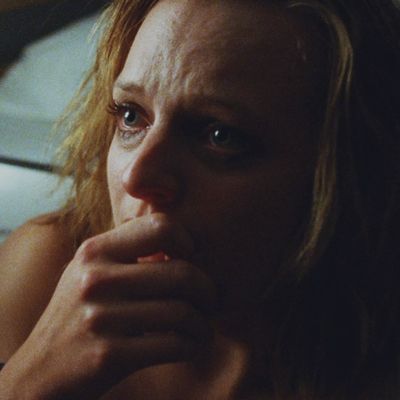
It is very hard to discuss Alex Ross Perry’s Queen of Earth without first talking about its opening scene. In tight close-up, Catherine (Elisabeth Moss), her eyes and cheeks dark pools of running mascara, cries, begs, and hurls accusations as her boyfriend James (Kentucker Audley) breaks up with her. The camera stays close on her throughout, with brief cutaways to the creepily calm James; the calmer he is, the more agitated she becomes. We may not see any blood on the screen, but, emotionally speaking, this might be the most violent scene of any film so far this year.
And that opening sets the tone well for the remainder of Perry’s film. We don’t ever see Catherine at such heightened levels of obvious despair again. But the agony, the paranoia, the sheer existential terror of grief becomes sublimated into the very style of the film. Queen of Earth is a psychodrama shot like a horror movie — Persona meets The Shining. Right down to the haunting, minimalist score (by Keegan DeWitt) that’s perched dangerously, wonderfully between spooky and lyrical.
Even the setting is one often shared by both genres — a secluded lake house, this one owned by the family of Catherine’s closest friend Virginia (Katherine Waterston). It has not been a good couple of months for Catherine; she has also lost her beloved artist father, in circumstances only half-explained but that hint at suicide. She’s come here to get away for a week, to recover and also to let James move out of their apartment back in New York. Her abject grief and emotional ruin stand in sharp contrast to the regal, reserved Virginia — who speaks words of compassion but often remains eerily distant. That contrast between the two friends becomes even more pronounced as the days go on, and Rich (Patrick Fugit), a neighbor and erstwhile squeeze for Virginia, comes over. His demeanor toward Catherine feels unnaturally callous, almost cruel. At times Virginia almost seems to encourage this. Is this Catherine’s paranoia acting up, or is there something more sinister going on here?
As the days pass, the narrative elongates and compresses in unpredictable ways; sometimes a quick little exchange will open up a new avenue of meaning before we cut away to something else. The film also jumps back to the previous summer — seen in both prolonged flashbacks and brief, mysterious cutaways — when Catherine and James visited Virginia during her time of need. And we begin to notice, ever so slowly, that the roles have been reversed from a year ago, when Catherine was smug and content in her co-dependent relationship with James and a cushy, nepotistic job with her dad, and Virginia was the one hovering on the edge of the abyss. There are little echoes throughout between the two timelines — everything from a cup of coffee to a brief argument over nicknames. (We see Virginia, in flashbacks, saying that only her friends can call her Ginny; we see Catherine, in the present, taking exception to Rich calling her “K.”)
Queen of Earth’s great strength is its unsettling mood, and the way Perry allows it to take over without cheapening the very serious, and very human, story he’s trying to tell. We can’t quite tell whether what we’re seeing is meant to be real, or if it has been corrupted by Catherine’s state of mind. For the most part, the suspense elements here don’t feel exploitative; they feel empathetic, compassionate. Credit should also go to Sean Price Williams’s cinematography — often consisting of those aforementioned uncomfortable close-ups, but also making ominous use of the lush, quiet setting — and Robert Greene’s elliptical editing. (Greene, an excellent filmmaker in his own right, made the documentary Actress, probably my favorite film from last year.)
Perry is a keen student of human behavior, and he has an eye and ear for the telling little details of corrosive relationships. I wasn’t a fan of his acclaimed, ambitious Listen Up Philip last year — there is such a thing as too much misanthropy — but I’m quite fond of his two early no-budget features, the twisted sibling drama The Color Wheel and his bizarre, beautiful riff on Gravity’s Rainbow, Impolex. (Both have just been released in a lovely new limited-edition DVD from Factory 25, which I highly recommend.) The Color Wheel in particular would make an excellent double feature with Queen of Earth, to demonstrate this writer-director’s incisive ability to find poetry in his characters’ cruelty and pain.


